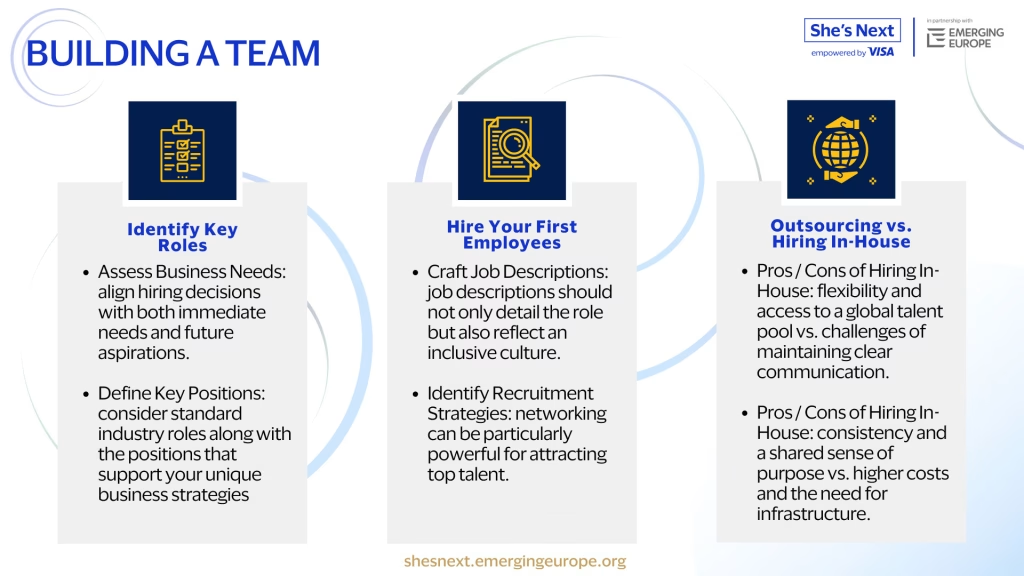
Building a Team
For any entrepreneur, building a strong team is the cornerstone of success, but for female entrepreneurs, who often face unique challenges in the business world, it’s especially critical.
A robust team can help overcome biases, expand networks, and provide diverse perspectives that drive innovation. This article will guide you through identifying key roles, hiring strategies, cultivating company culture, and deciding between outsourcing and hiring in-house.
Identifying Key Roles
Assessing Business Needs
Aligning hiring decisions with both immediate needs and future aspirations is vital. This may also mean considering candidates who bring different strengths to the table, such as emotional intelligence and collaborative skills, which are essential for creating a balanced and inclusive workplace.
Defining Key Positions
While standard industry roles are important, female entrepreneurs should also consider positions that support their unique business strategies. This might include roles focused on community engagement or diversity and inclusion, which can be particularly beneficial in fostering a broader customer base and an empowering company ethos.
Hiring Your First Employees
Crafting Job Descriptions
Job descriptions should not only detail the role but also reflect an inclusive culture that welcomes applicants from all walks of life. For female entrepreneurs, emphasizing a commitment to diversity can attract candidates who value equality and representation, which is crucial for building a well-rounded team.
Recruitment Strategies
Networking can be particularly powerful for female entrepreneurs, as it allows you to tap into diverse talent pools and gain access to candidates who might otherwise be overlooked. Interviews should assess cultural fit and the potential for candidates to contribute to a supportive environment where all employees, regardless of gender, can thrive.

Developing a Company Culture
A positive company culture is essential for retention and productivity. Female entrepreneurs can lead by example, creating cultures that champion work-life balance, mutual support, and equal opportunities for advancement. This can be particularly appealing to top talent who seek environments that challenge the status quo.
Outsourcing vs. Hiring In-House
Pros and Cons of Outsourcing
Outsourcing offers flexibility and access to a global talent pool. It can be a way to build a team that transcends geographical and cultural boundaries, bringing in fresh ideas and perspectives. However, it’s important to maintain clear communication and ensure that outsourced teams align with the company’s values and standards.
Pros and Cons of Hiring In-House
In-house teams offer consistency and a shared sense of purpose. Having a dedicated in-house team can foster a close-knit community that supports one another’s growth. The main considerations include the costs associated with full-time staff and the need to create an infrastructure that supports their development.
Assembling a high-performing team is a strategic process that holds particular significance for female entrepreneurs who may face unique challenges in male-dominated industries.
Having a strong team can provide crucial support, mentorship, and networking opportunities. By carefully selecting and nurturing a high-performing team, you can enhance your chances of success and overcome obstacles more effectively.
A dynamic team can not only propel your company forward but also contribute to a more equitable and diverse business landscape.
New Free Courses — Made for Ambitious Women Entrepreneurs!
It’s time to grow smarter, adapt faster, and take your business global.
Explore two powerful courses available exclusively to She’s Next members:
The Reinvention Masterclass for Start-up Founders
Beyond Borders: Building for Global Success
Enroll today — it’s free!






Responses